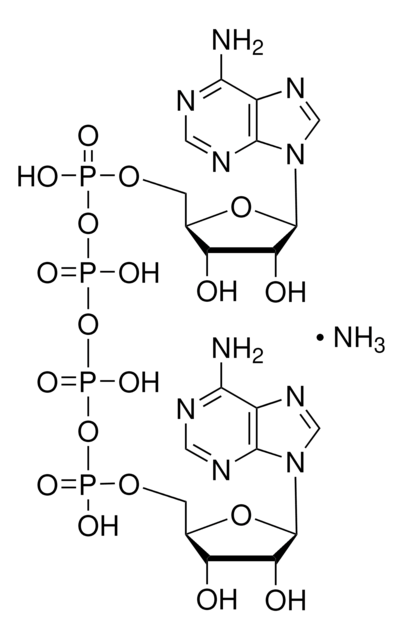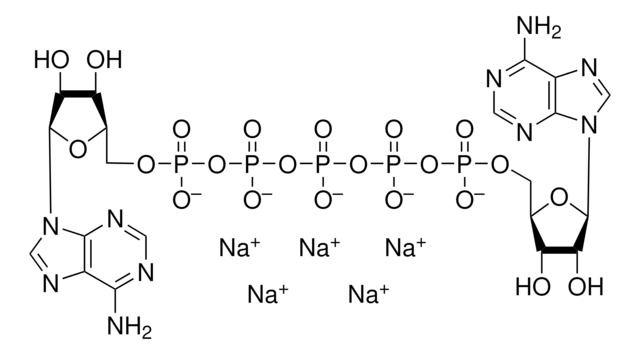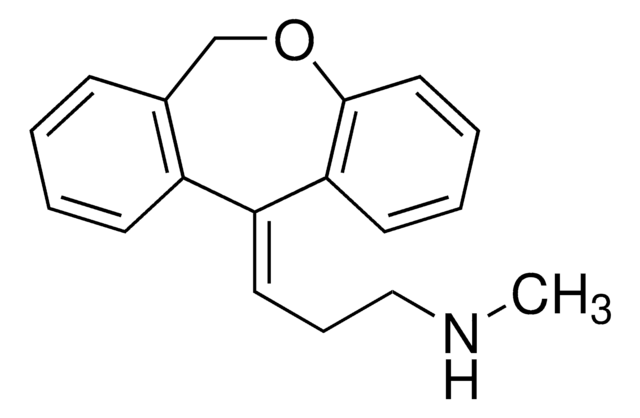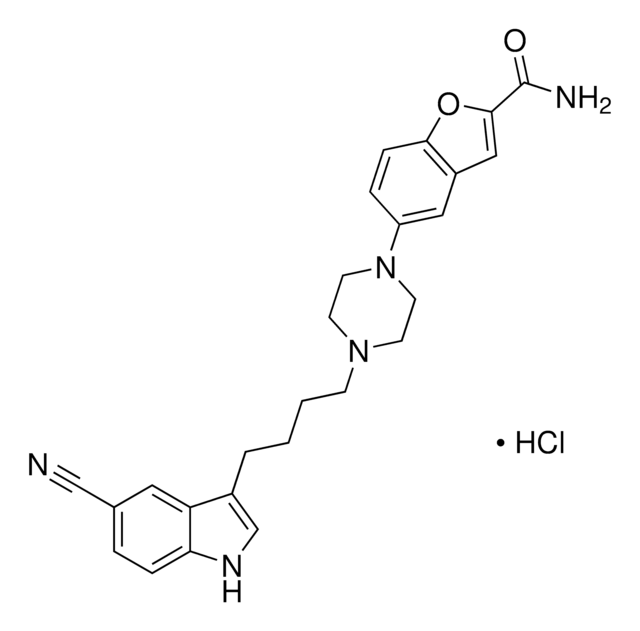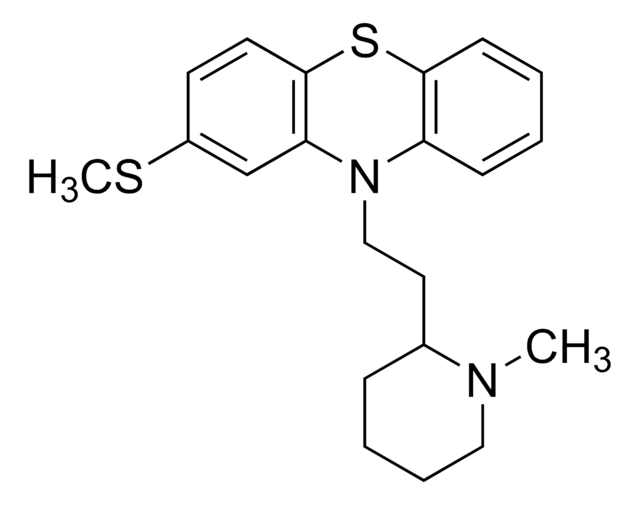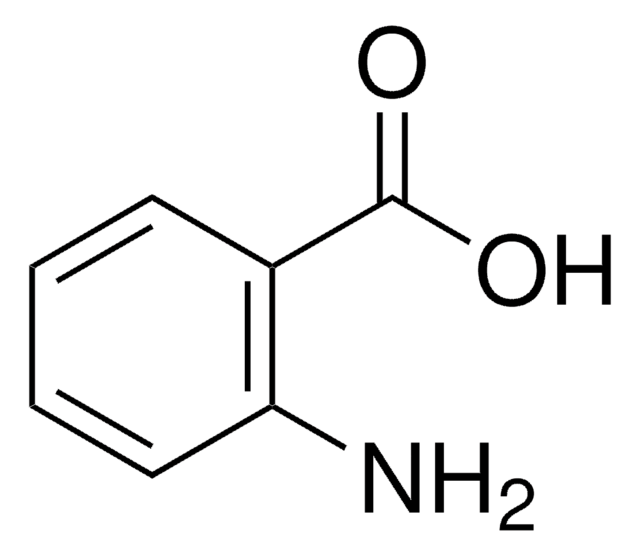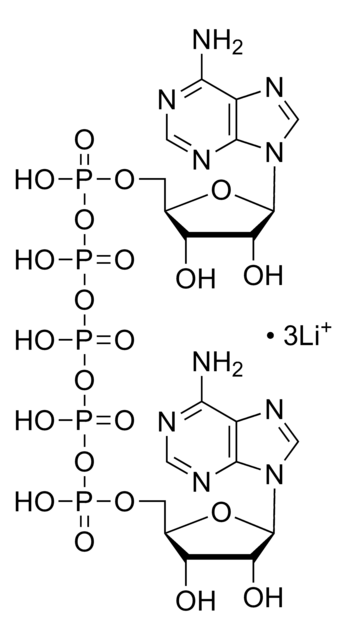D8013
P1,P5-Di(adenosine-5′) pentaphosphate ammonium salt
≥95% (HPLC), powder
동의어(들):
A(5′)P5(5′)A, Diadenosine pentaphosphate ammonium salt
로그인조직 및 계약 가격 보기
모든 사진(3)
About This Item
실험식(Hill 표기법):
C20H29N10O22P5 · xNH3 · yH2O
CAS Number:
Molecular Weight:
916.37 (anhydrous free acid basis)
MDL number:
UNSPSC 코드:
12352202
eCl@ss:
32160414
PubChem Substance ID:
NACRES:
NA.77
추천 제품
생물학적 소스
synthetic (organic)
분석
≥95% (HPLC)
양식
powder
색상
white to off-white
solubility
H2O: 50 mg/mL
저장 온도
−20°C
SMILES string
O[C@@H]1[C@@H](COP(OP(O)(OP(O)(OP(O)(OP(O)(OC[C@@H]2[C@@H](O)[C@@H](O)[C@H](N(C=N3)C4=C3C(N)=NC=N4)O2)=O)=O)=O)=O)(O)=O)O[C@@H](N(C=N5)C6=C5C(N)=NC=N6)[C@@H]1O
InChI
1S/C10H14N5O8P3/c11-9-8-10(13-4-12-9)15(5-14-8)7-2-1-6(21-7)3-20-25(16,17)23-26(18,19)22-24/h1-2,4-7H,3,24H2,(H,16,17)(H,18,19)(H2,11,12,13)/t6-,7+/m0/s1
InChI key
LWOSDYWLTWLFID-NKWVEPMBSA-N
생화학적/생리학적 작용
A diadenosine polyphosphate stored in secretory granules of thrombocytes, chromaffin and neuronal cells.
A diadenosine polyphosphate stored in secretory granules of thrombocytes, chromaffin and neuronal cells. After release into the extracellular space, it affects a variety of biological activities in a wide range of target tissues. In the nervous system it acts through various purinergic receptors. It also activates 5′-nucleotidase and inhibits adenosine kinase activity in vitro. Ap5A is metabolized by soluble enzymes in the blood plasma and by membrane-bound ectoenzymes of a number of cell types including endothelial and smooth muscle cells. In heart, it increases contractile force and action potential duration, and shows an anti-β-adrenergic effect.
Storage Class Code
11 - Combustible Solids
WGK
WGK 3
Flash Point (°F)
Not applicable
Flash Point (°C)
Not applicable
개인 보호 장비
Eyeshields, Gloves, type N95 (US)
G J Brewer et al.
Journal of neurochemistry, 74(5), 1968-1978 (2000-05-09)
The loss of ATP, which is needed for ionic homeostasis, is an early event in the neurotoxicity of glutamate and beta-amyloid (A(beta)). We hypothesize that cells supplemented with the precursor creatine make more phosphocreatine (PCr) and create larger energy reserves
Yapeng Ji et al.
Nature communications, 8, 15308-15308 (2017-05-19)
Targeting the specific metabolic phenotypes of colorectal cancer stem cells (CRCSCs) is an innovative therapeutic strategy for colorectal cancer (CRC) patients with poor prognosis and relapse. However, the context-dependent metabolic traits of CRCSCs remain poorly elucidated. Here we report that
자사의 과학자팀은 생명 과학, 재료 과학, 화학 합성, 크로마토그래피, 분석 및 기타 많은 영역을 포함한 모든 과학 분야에 경험이 있습니다..
고객지원팀으로 연락바랍니다.